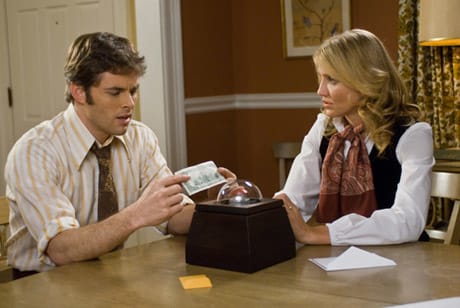Ever wondered what a collaboration between Alfred Hitchcock and Ed Wood would turn out like? Apparently, Donnie Darko and Southland Tales writer/director Richard Kelly did. It's the kind of convoluted paradox Kelly is obsessed with, to the point where what's awkwardly off with The Box might be just as intentional as what's beautiful right.
The set up closely mirrors the book and old Twilight Zone episode it's based upon, although with a few extra details important to the greater plot. Norma and Arthur Lewis, a mostly happily married couple, find an unmarked package on their doorstep, inside of which is a wooden box with a plastic dome on top covering a red button. The following day, the mysterious Arlington Steward (played with creepy serenity by Frank Langella) arrives to explain the rules of the box: press the button and someone you don't know dies and you get a million dollars, tax-free.
Using short story Button, Button by the godfather of morality horror, Richard Matheson, as a springboard for his wacky amalgam of mysterious sci-fi predilections, Kelly milks the original story's sacred cow early to cleanse the tension on the way to his moth-chewed master plan. Kelly knows his audience and is such an uber-geek that he can't resist acknowledging, addressing and immediately spinning all expectations of anyone clued into the original story's haunting climax. It's a boon that gives the film a life of its own, but also turns Kelly loose to indulge in fanciful tangents that don't necessarily pay off.
The cinematography and art design are gorgeous, the special effects mostly fantastic and used to subtle wowing effect, and the score (by Owen Pallet and members of the Arcade Fire) is sinister and stimulating, deserving of an Oscar nod. This all showcases a vibrant talent for classic mystery suspense filmmaking, but an oddly campy tone dips in and out of the film, producing odd laughs and eerie suspense with ample intrigue while also fingering The Box as a shark-jumping champion.
James Marsden and Cameron Diaz give solid performances, with the former beginning to find his humanity as an actor. While some complain about the lack of ideas in Hollywood, especially in the heat of remake fever, Kelly is afflicted with an overabundance but lacks a solid editing hand to help contain them within a comprehensible package.
(Warner)The set up closely mirrors the book and old Twilight Zone episode it's based upon, although with a few extra details important to the greater plot. Norma and Arthur Lewis, a mostly happily married couple, find an unmarked package on their doorstep, inside of which is a wooden box with a plastic dome on top covering a red button. The following day, the mysterious Arlington Steward (played with creepy serenity by Frank Langella) arrives to explain the rules of the box: press the button and someone you don't know dies and you get a million dollars, tax-free.
Using short story Button, Button by the godfather of morality horror, Richard Matheson, as a springboard for his wacky amalgam of mysterious sci-fi predilections, Kelly milks the original story's sacred cow early to cleanse the tension on the way to his moth-chewed master plan. Kelly knows his audience and is such an uber-geek that he can't resist acknowledging, addressing and immediately spinning all expectations of anyone clued into the original story's haunting climax. It's a boon that gives the film a life of its own, but also turns Kelly loose to indulge in fanciful tangents that don't necessarily pay off.
The cinematography and art design are gorgeous, the special effects mostly fantastic and used to subtle wowing effect, and the score (by Owen Pallet and members of the Arcade Fire) is sinister and stimulating, deserving of an Oscar nod. This all showcases a vibrant talent for classic mystery suspense filmmaking, but an oddly campy tone dips in and out of the film, producing odd laughs and eerie suspense with ample intrigue while also fingering The Box as a shark-jumping champion.
James Marsden and Cameron Diaz give solid performances, with the former beginning to find his humanity as an actor. While some complain about the lack of ideas in Hollywood, especially in the heat of remake fever, Kelly is afflicted with an overabundance but lacks a solid editing hand to help contain them within a comprehensible package.
